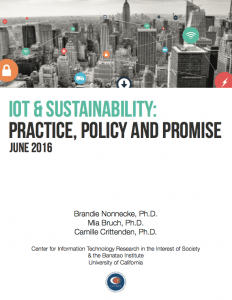White Paper: IoT & Sustainability: Practice, Policy, and Promise

Who will you meet?
Cities are innovating, companies are pivoting, and start-ups are growing. Like you, every urban practitioner has a remarkable story of insight and challenge from the past year.
Meet these peers and discuss the future of cities in the new Meeting of the Minds Executive Cohort Program. Replace boring virtual summits with facilitated, online, small-group discussions where you can make real connections with extraordinary, like-minded people.
By 2050 nearly two-thirds of the world’s population will live in cities. The global challenges of natural resource and infrastructure management are immense: global temperatures are rising, water shortages are more frequent, and energy systems are overburdened. The “Internet of Things” (IoT)- physical objects embedded with software, sensors, and network connectivity- are poised to play a key role in enabling resilient and equitable management of urban environments.
This summer, UC Berkeley’s Center for Information Technology Research in the Interest of Society (CITRIS), partnering with Microsoft, recently released “IoT & Sustainability: Practice, Policy, and Promise,” a white paper which explored how new IoT technologies can improve sustainability in cities.
IoT & Sustainability: Practice, Policy, and Promise
The paper focuses on three key sectors: water, energy, and transportation- and surveyed the landscape of IoT tools to improve sustainability in each of these areas, as well as bringing together existing examples and case studies. It discussed a wide range of technologies that can make cities not only smarter, but more sustainable, showing how IoT can provide real-time data collection on the availability and use of energy and water resources, facilitating more informed resource conservation, and can streamline data collection on traffic patterns and parking availability, decreasing gas consumption and CO2 emissions.
The paper not only illustrated the potential sustainability benefits of IoT, but also addressed the challenges inherent in IoT implementation. The paper also includes recommendations to city-level officials seeking to employ IoT technologies, encouraging a holistic perspective based on public-private engagement, the cultivation of public-private-academic partnerships for mutually beneficial outcomes, and the balancing of concerns privacy, security, and interoperability with trust, reliability, and transparency. It also highlighted the continuing relevance of issues of access and equality in insuring outcomes that are both sustainable and just.
The paper was accompanied by a public symposium held at UC Berkeley, which brought together leaders from industry, academic, and government to discuss the promise of IoT for enhancing sustainability in the urban environment. The event can be viewed at http://bit.ly/289wkDL.
Discussion
Leave your comment below, or reply to others.
Please note that this comment section is for thoughtful, on-topic discussions. Admin approval is required for all comments. Your comment may be edited if it contains grammatical errors. Low effort, self-promotional, or impolite comments will be deleted.
Read more from MeetingoftheMinds.org
Spotlighting innovations in urban sustainability and connected technology
Middle-Mile Networks: The Middleman of Internet Connectivity
The development of public, open-access middle mile infrastructure can expand internet networks closer to unserved and underserved communities while offering equal opportunity for ISPs to link cost effectively to last mile infrastructure. This strategy would connect more Americans to high-speed internet while also driving down prices by increasing competition among local ISPs.
In addition to potentially helping narrow the digital divide, middle mile infrastructure would also provide backup options for networks if one connection pathway fails, and it would help support regional economic development by connecting businesses.
Wildfire Risk Reduction: Connecting the Dots
One of the most visceral manifestations of the combined problems of urbanization and climate change are the enormous wildfires that engulf areas of the American West. Fire behavior itself is now changing. Over 120 years of well-intentioned fire suppression have created huge reserves of fuel which, when combined with warmer temperatures and drought-dried landscapes, create unstoppable fires that spread with extreme speed, jump fire-breaks, level entire towns, take lives and destroy hundreds of thousands of acres, even in landscapes that are conditioned to employ fire as part of their reproductive cycle.
ARISE-US recently held a very successful symposium, “Wildfire Risk Reduction – Connecting the Dots” for wildfire stakeholders – insurers, US Forest Service, engineers, fire awareness NGOs and others – to discuss the issues and their possible solutions. This article sets out some of the major points to emerge.
Innovating Our Way Out of Crisis
Whether deep freezes in Texas, wildfires in California, hurricanes along the Gulf Coast, or any other calamity, our innovations today will build the reliable, resilient, equitable, and prosperous grid tomorrow. Innovation, in short, combines the dream of what’s possible with the pragmatism of what’s practical. That’s the big-idea, hard-reality approach that helped transform Texas into the world’s energy powerhouse — from oil and gas to zero-emissions wind, sun, and, soon, geothermal.
It’s time to make the production and consumption of energy faster, smarter, cleaner, more resilient, and more efficient. Business leaders, political leaders, the energy sector, and savvy citizens have the power to put investment and practices in place that support a robust energy innovation ecosystem. So, saddle up.







0 Comments